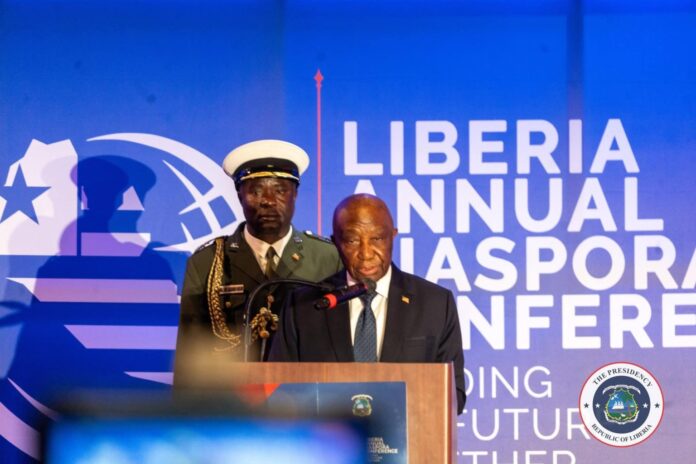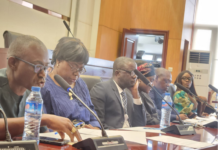
Monrovia, Liberia — President Joseph Nyuma Boakai has called on Liberians living abroad to become active partners in the country’s development efforts, emphasizing their strategic importance in shaping Liberia’s future. Speaking at the inaugural Liberia Annual Diaspora Conference, held under the theme “Renewing Liberia Together: Building a Future of Opportunity for All,” Boakai assured the diaspora community that they would not remain “mere observers” but would be integral to the nation’s transformation agenda.
The 2025 conference convened Liberians from across North America, Europe, Africa, Asia, and the Caribbean, showcasing the global reach and diversity of the diaspora.
Diaspora as a Catalyst for Renewal
President Boakai described the diaspora as a “vital force” in building an inclusive and prosperous Liberia. He praised their contributions, particularly through remittances, which he said have sustained families, supported education, and stabilized households. “Now that you have given fish, teach us to fish,” Boakai urged, calling on diaspora Liberians to leverage their expertise, networks, and resources to stimulate private sector growth and national development.
A Commitment to Mutual Partnership
Boakai emphasized that effective collaboration requires mutual trust and accountability. He pledged his administration’s commitment to creating a transparent and enabling environment for investment, citing improvements in infrastructure, healthcare, education, utilities, and security. He also announced plans for a Diaspora Investment Fund to facilitate joint initiatives.
“We understand that partnership is a two-way street,” Boakai said. “My administration is committed to working with you to build a future of shared prosperity.”
Liberia’s Global Repositioning
Referencing Liberia’s recent election to a non-permanent seat on the United Nations Security Council, Boakai described the achievement as a “defining moment” in the country’s renewal. He outlined his government’s ARREST Agenda—Agriculture, Roads, Rule of Law, Education, Sanitation, Tourism, and Technology—as the foundation for Liberia’s Vision 2030, which aims to transition the country to lower middle-income status.
Governance and Economic Reform
Addressing governance challenges, Boakai criticized past leadership for mismanagement and lack of accountability. “The days of benevolent leadership are gone,” he said. “We must reform governance to give voice and power to citizens across all counties.” He pledged to pursue decentralization, constitutional reforms, and participatory governance to reduce Monrovia-centric decision-making.
On economic transformation, Boakai noted that despite Liberia’s natural wealth, over a third of the population lives in poverty. He called for a shift from an extractive economy to one that adds value, promotes local ownership, and prioritizes agriculture. “We must replace growth without development with growth that delivers development,” he said.
Reconciliation and Social Inclusion
Boakai also addressed Liberia’s history of social, ethnic, and generational divisions, which he said continue to hinder national unity. He reaffirmed his commitment to peace and reconciliation, emphasizing the need to confront past injustices. “Overlooking impurity and expecting peaceful coexistence is like plaiting hair without first picking the louse,” he said.
Since the end of civil conflict in 2003, Liberia has embarked on a long journey of rebuilding trust and redefining its national identity. Boakai stressed that the path forward must be rooted in truth, justice, and compassion.






















